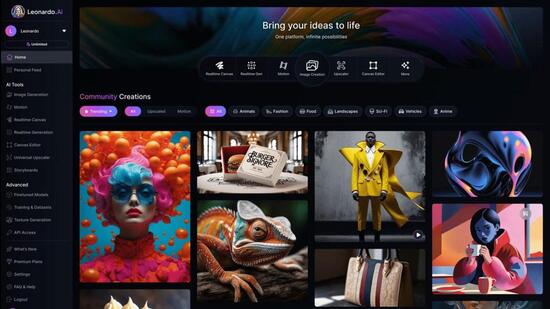In what could prove to be one of the most significant artificial intelligence (AI) acquisitions this year, Canva has completed the deal for Australian generative AI company Leonardo.AI. This will undoubtedly strengthen Canva’s AI suite for consumers, small business and enterprises, as it competes on multiple fronts, including with Adobe, Microsoft and Google. The financial terms of the deal haven’t been disclosed, but for Canva which now has more than 190 million users worldwide, this will add another layer of versatility to its existing tools, including Magic Media.
“This field is constantly evolving, and Leonardo’s technical leadership and community impact can’t be overstated. Bringing our worlds together will accelerate each of our teams’ work, taking us from strength to strength, and we can’t wait to get started,” says Cameron Adams, co-founder and Chief Product Officer of Canva.
Also read: Exclusive | Most cutting-edge tools use AI built in-house: Canva’s Cameron Adams
Arriving within Canva’s fold will be Leonardo.Ai’s foundational model, and team of 120 researchers, engineers, and designers. Their foundation model is called Phoenix. Canva makes it clear that Leonardo.AI’s brand and identity will remain untouched. “Leonardo.Ai will continue to develop its web platform for its millions of users, including its business customers,” the company confirms. They will now, however, have Canva’s financial resources as well as access to licensed content from the Canva Creators program.
“We speak to creatives every day and we love seeing what they can do using Leonardo.Ai. The possibilities are endless, and we’re excited to bring more power and control to every creator’s workflow. As part of Canva, we will have the support to significantly scale the Leonardo.Ai platform, and we’re excited about the pipeline of cool new features we are planning to bring to market,” Leonardo.AI says, in a statement announcing the deal with Canva.
Also read: Canva’s smart acquisitions fuel its latest chapter of growth
Canva has used its recent acquisitions smartly. For its one of its kind application suite covering a spectrum of visual communication and workplace tools, adding Leonardo.AI which was founded in 2022 follows on a trend from recent years, with the UK-based Serif’s Affinity being another standout example.
In Affinity’s instance, they were able to tap the “pro” tools appreciated by a demographic of users– Affinity’s focus areas are professional photo editing, illustration, graphic design and page layout. At Canva Create 2024 this summer, Affinity released v2.5, which includes new advanced editing options that further pushes the capabilities envelope for ‘pro’ editing performance. The upgrades also bring Variable Font support which opens a new world of typographic design choices for designers, and an addition of a Stroke Width Tool for an on-document way of editing the pressure profile of any curve.
Also read: Canva sharpens focus on enterprises as a refreshed UI waits to be discovered
For Canva, the Magic Studio which received significant updates this summer, access to the Phoenix foundation model may prove crucial. The company insists they will not waste any time in getting the integration in place. “We plan to rapidly integrate Leonardo’s leading technology and their Phoenix foundational model into our existing suite of Magic Studio products, such as our AI image and video generator, Magic Media. Deeper investment into foundational model research and development will be pivotal to both Canva and Leonardo,” Canva says, in a statement.
Access to Leonardo’s customers across businesses and enterprises, adoption which has already seen 19 million users, could help Canva make further inroads into the enterprise space. Leonardo.AI’s present set of tools includes an AI art generator, an AI video generator, a transparent PNG generator for consumers. Alongside, they have AI marketing and AI graphics design tools, as well as architecture generation capabilities, interior design and printing solutions.
